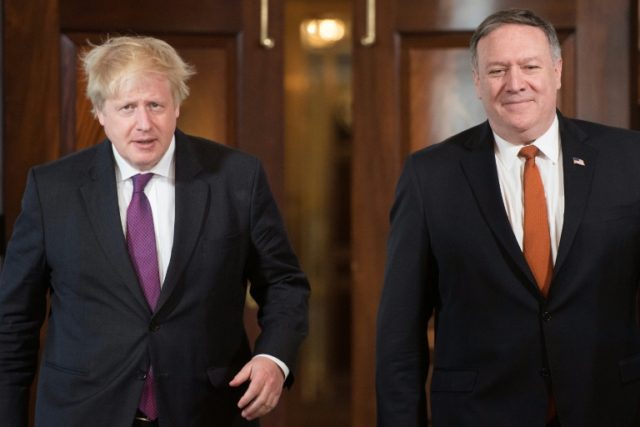Washington (AFP) – British Foreign Secretary Boris Johnson came to Washington on Monday to lobby US President Donald Trump’s administration as European capitals mounted a last-ditch push to save the Iran nuclear deal.
London’s top diplomat even tried to reach out to the US leader through his favorite TV show, appearing on “Fox and Friends” to warn against pulling out of the accord without a back-up plan.
Then it was on to the State Department, for talks with Secretary of State Mike Pompeo, a former CIA director and anti-Iran hawk who is expected to back any Trump decision to quit the deal on May 12.
Johnson said nothing publicly as he shook hands with Pompeo ahead of their chat, but on Fox, he had warned that “Plan B does not seem to be, to me, particularly well-developed at this stage.”
He also tried flattery, telling Sky News that if Trump can “fix” the Iran deal and engineer a thaw with North Korea, he would deserve a Nobel Prize like the one his predecessor Barack Obama won.
Later, Johnson was to meet with Vice President Mike Pence, but if his banging on doors and media blitz don’t pay off, the omens for the international nuclear accord are ominous.
Trump has threatened to torpedo the 2015 pact when a US sanctions waiver comes up for renewal on May 12, unless European signatories Britain, France and Germany fix its “terrible flaws.”
The deal was signed between Iran and six world powers, so nothing the so-called EU three can do would allow them to rewrite it — but they have promised to work on a powerful supplemental agreement.
US diplomats have been working furiously with their British, French and German partners to make this a reality, with measures to limit Iran’s ballistic missile program and regional subversion.
But so far, all signs point to Trump making good on his threat, with no successor arrangement in place — leading US allies to fear that Iran may retaliate or relaunch its alleged quest for the bomb.
German Foreign Minister Heiko Maas warned the accord’s collapse could spark “an escalation” in the region and stressed that Washington’s European allies think the deal “makes the world a safer place.”
His French counterpart Jean-Yves Le Drian, on a visit to Berlin, said the agreement is “the right way to stop Iran from getting access to nuclear weapons” and “will save us from nuclear proliferation.”
– Israeli intel package –
Under the landmark nuclear pact, also signed by Russia and China, Iran agreed to scale back nuclear enrichment and put its program under international supervision in return for sanctions relief.
Tehran has consistently denied it was ever seeking a nuclear bomb, but none of the other signatories believed this, and last week Israel released intelligence on an alleged pre-2003 weapons program.
Trump has consistently complained about the agreement, reached under Obama, citing as its shortcomings certain clauses such as the “sunset” provisions lifting some nuclear restrictions on Tehran from 2025.
In an attempt to salvage the deal, French President Emmanuel Macron has pushed to extend its scope to address this issue, as well as Iran’s missile capabilities and its role in the region.
Iran’s support for Syrian President Bashar al-Assad, the Lebanese armed group Hezbollah in Syria’s civil war and Shiite Huthi rebels in Yemen have added to tension between Tehran and Western powers.
Iran’s President Hassan Rouhani on Sunday issued a strong warning to the United States not to quit the pact.
“If the United States leaves the nuclear agreement, you will soon see that they will regret it like never before in history,” Rouhani said.
He also vehemently reiterated his country’s opposition to curtailing its non-nuclear missile capabilities, insisting Tehran “will build as many missiles and weapons as needed.”
burs-dc/sst

COMMENTS
Please let us know if you're having issues with commenting.